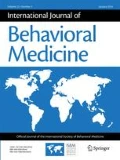Abstract
While we agree that personal financial incentives (PFIs) may have some utility in public health interventions to motivate people in the uptake and persistence of health behaviour, we disagree with some of the sentiments outlined by Lynagh et al. (Int J Behav Med 20:114–120, 2012). Specifically, we feel that the article gives a much stronger impression that PFIs will likely lead to long-term behaviour change once the incentive has been removed than is warranted by current research. This claim has not received strong empirical support nor is it grounded in psychological theory on the role of incentives and motivation. We also feel that the presentation of some of the tenets of self-determination theory by the authors is misleading. Based on self-determination theory, we propose that PFIs, without sufficient consideration of the mechanisms by which external incentives affect motivation and the interpersonal context in which they are presented, are unlikely to lead to persistence in health behaviour once the incentive is removed. We argue that interventions that adopt PFIs as a strategy to promote health-behaviour change should incorporate strategies in the interpersonal context to minimise the undermining effect of the incentives on intrinsic motivation. Interventions should present incentives as informational regarding individuals’ competence rather than as purely contingent on behavioural engagement and emphasise self-determined reasons for pursuing the behaviour.
References
Schwartz B. Incentives, choice, education and well-being. Oxf Rev Educ. 2009;35(3):391–403. doi:10.1080/03054980902934993.
Deci EL, Ryan RM. Intrinsic motivation and self-determination in human behavior. New York: Plenum Press; 1985.
Deci EL, Ryan RM. The “What” and “Why” of goal pursuits: human needs and the self-determination of behavior. Psychol Inquiry. 2000;11:227–68.
Deci EL, Ryan RM. An overview of self-determination theory: an organismic-dialectical perspective. In: Deci EL, Ryan RM, editors. Handbook of self-determination research. New York: University of Rochester Press; 2002. p. 3–33.
Deci EL, Koestner R, Ryan RM. A meta-analytic review of experiments examining the effects of extrinsic rewards on intrinsic motivation. Psychol Bull. 1999;125:627–68.
Ryan RM. Control and information in the intrapersonal sphere: an extension of cognitive evaluation theory. J Pers Soc Psychol. 1982;43:450–61.
Ryan RM, Mims V, Koestner R. Relation of reward contingency and interpersonal context to extrinsic motivation: a review and test using cognitive evaluation theory. J Pers Soc Psychol. 1983;45:736–50.
Deci EL, Koestner R, Ryan RM. The undermining effect is a reality after all - Extrinsic rewards, task interest, and self-determination: reply to Eisenberger, Pierce, and Cameron (1999) and Lepper, Henderlong, and Gingras (1999). Psychol Bull. 1999;125:692–700.
Lynagh MC, Sanson-Fisher RW, Bonevski B. What’s good for the goose is good for the gander. Guiding principles for the use of financial incentives in health behaviour change. Int J Behav Med. 2013;20(1):114–20. doi:10.1007/s12529-011-9202-5.
Burns RJ, Donovan AS, Ackermann RT, Finch EA, Rothman AJ, Jeffery RW. A theoretically grounded systematic review of material incentives for weight loss: implications for interventions. Ann Behav Med. 2012;44(3):375–88. doi:10.1007/s12160-012-9403-4.
Jeffery RW. Financial incentives and weight control. Prev Med. 2012;55:S61–7. doi:10.1016/j.ypmed.2011.12.024.
Volpp KG, Troxel AB, Pauly MV, Glick HA, Puig A, Asch DA, et al. A randomized, controlled trial of financial incentives for smoking cessation. N Engl J Med. 2009;360(7):699–709. doi:10.1056/NEJMsa0806819.
Higgins ST, Heil SH, Solomon LJ, Bernstein IM, Lussier JP, Abel RL, et al. A pilot study on voucher-based incentives to promote abstinence from cigarette smoking during pregnancy and postpartum. Nicotine Tob Res. 2004;6(6):1015–20. doi:10.1080/14622200412331324910.
Michie S, Abraham C. Advancing the science of behaviour change: a plea for scientific reporting. Addiction. 2008;103(9):1409–10. doi:10.1111/j.1360-0443.2008.02291.x.
Heil SH, Higgins ST, Bernstein IM, Solomon LJ, Rogers RE, Thomas CS, et al. Effects of voucher-based incentives on abstinence from cigarette smoking and fetal growth among pregnant women. Addiction. 2008;103(6):1009–18. doi:10.1111/j.1360-0443.2008.02237.x.
Moller AC, McFadden HG, Hedeker D, Spring B. Financial motivation undermines maintenance in an intensive diet and activity intervention. J Obesity. 2012;2012:740519.
Fryer RG. Financial incentives and student achievement: evidence from randomized trials. Q J Econ. 2011;126(4):1755–98. doi:10.1093/qje/qjr045.
Ryan RM, Chandler C, Connell JP, Deci EL, editors. Internalization and motivation: some preliminary research and theoretical speculations. Washington, DC: ERIC Clearinghouse; 1983. Annual Meeting for the Society for Research in Child Development; Detroit, MI.
Deci EL, Ryan RM. The support of autonomy and the control of behavior. J Pers Soc Psychol. 1987;53:1024–37.
Ryan RM, Plant RW, O’Malley S. Initial motivations for alcohol treatment: relations with patient characteristics, treatment involvement and dropout. Addict Behav. 1995;20:279–97.
Hagger MS, Chatzisarantis NLD. Causality orientations moderate the undermining effect of rewards on intrinsic motivation. J Exp Soc Psychol. 2011;47(1):485–9. doi:10.1016/j.jesp.2010.10.010.
Deci EL, Eghrari H, Patrick BC, Leone DR. Facilitating internalization: the self-determination theory perspective. J Pers. 1994;62:119–42.
Joussemet M, Koestner R, Lekes N, Houlfort N. Introducing uninteresting tasks to children: a comparison of the effects of rewards and autonomy support. J Pers. 2004;72:140–66.
Ng JYY, Ntoumanis N, Thøgersen-Ntoumani C, Deci EL, Ryan RM, Duda JL, et al. Self-determination theory applied to health contexts. Perspect Psychol Sci. 2012;7(4):325–40. doi:10.1177/1745691612447309.
Deci EL, Ryan RM. The general causality orientations scale: self-determination in personality. J Res Pers. 1985;19:109–34.
McLachlan S, Hagger MS. Do people differentiate between intrinsic and extrinsic goals in physical activity behavior? J Sport Exerc Psychol. 2011;33(2):273–88.
Marteau TM, Ashcroft RE, Oliver A. Using financial incentives to achieve healthy behaviour. Br Med J. 2009;338:b1415. doi:10.1136/bmj.b1415.
Citizens Council NICE. The use of incentives to improve health. London: National Institute for Health and Clinical Excellence; 2010.
Author information
Authors and Affiliations
Corresponding author
Additional information
Commentary on Lynagh, M. C., Sanson-Fisher, R. W., &Bonevski, B. (2013). What’s good for the goose is good for the gander. Guiding principles for the use of financial incentives in health-behaviour change. International Journal of Behavioural Medicine, 20, 114–120.
Rights and permissions
About this article
Cite this article
Hagger, M.S., Keatley, D.A., Chan, D.C.K. et al. The Goose Is (Half) Cooked: a Consideration of the Mechanisms and Interpersonal Context Is Needed to Elucidate the Effects of Personal Financial Incentives on Health Behaviour. Int.J. Behav. Med. 21, 197–201 (2014). https://doi.org/10.1007/s12529-013-9317-y
Published:
Issue Date:
DOI: https://doi.org/10.1007/s12529-013-9317-y

